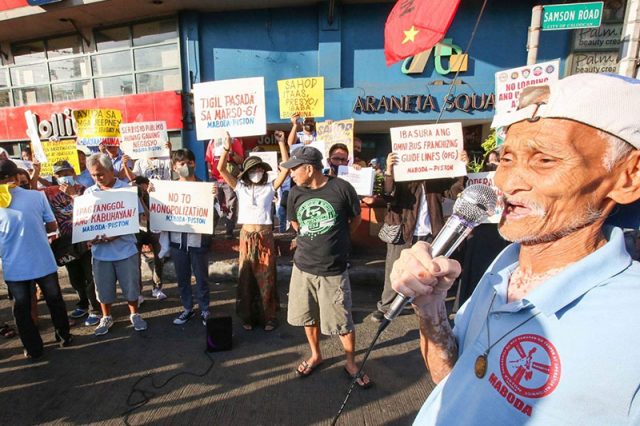
Some groups shared their reasons for supporting the nationwide week-long transport strike of traditional jeepneys and UV Express from March 6 to 12.
The series of protests are initiated by various transport groups who have issues with the government’s pending implementation of the Public Utility Vehicle (PUV) Modernization Program.
Initially, this will be implemented by June 30 but the government moved it to December 31 to give operators more time to consolidate into corporations or cooperatives.
This is because jeepney drivers and operators are required to form and join such entities if they want their franchises to be renewed by the set date.
According to the Land Transportation and Franchising and Regulatory Board (LTFRB), being a part of a cooperative means that boundaries will no longer be needed since the drivers will be considered employees entitled to regular salaries and other mandated benefits.
Meanwhile, for transport operators, the cost of the PUV modernization program will bury them in debt through hefty loans and maintenance issues.
Major transport group PISTON said operators would be required to purchase 15 imported minibusses per route.
They added that a modern minibus costs around P2.4 million to P2.8 million per unit, while a traditional jeepney only costs P200,000 to P600,000.
An alliance of public transport commuters said the modernization might hike minimum fare rates to as high as P35, a blow to the riding public as the country deals with a staggering 8.7% inflation rate.
ALSO READ: Commuters rally behind transport groups’ week-long strike
This is the first major coordinated transport strike since full passenger capacity resumed last March as industries resume their on-site work setup and schools return to face-to-face learning.
Commuters on Monday, the first day of the protests, were greeted with long passenger queues and jam-packed buses during the morning rush hour.
Why are some organizations supporting the demonstrations?
Here are their reasons:
Student Christian Movement of the Philippines
For SCMP, the public must “see Christ among the oppressed,” “spread the good news of the hope through struggle,” “become fishers of the people,” “carry the cross of the marginalized,” and “triumph against the death of lives and livelihood.”
“Among many reasons, including drivers being subjected to crippling debt and loss of livelihood that affects about 2 [two] million families to red-tagging by the government, Christ also experienced poverty, lack of social support and persecution from the state,” the organization said in a Facebook post.
It also cited Bible verses as references to its phrases.
SCMP called the PUV modernization program a “cross” that jeepney drivers will be burdened with since it is “oppressive, anti-poor, colonial, [and] elitist.”
Gabriela Youth
The youth organization of the Gabriela Women’s Party also cited reasons why some students and youth groups are against the phaseout of jeepneys and UV Express.
They said about 330,000 jeepney drivers and 20,000 small public utility jeepney operators will lose their jobs once the PUV modernization program takes place.
It added that an imported modern jeep costs P2.5 to 2.8 million per unit, which they said cannot be afforded by small operators.
Gabriela Youth also said that this would increase the minimum fare to about P25 to P40.
“Kung tataas ang halaga ng transportasyon sa gitna ng napakatinding krisis sa sahod, trabaho, mataas na presyo ng bilihin, along mababaon sa kahirapan ang pamilyang Pilipino,” the org said.
AGHAM
For Advocates of Science and Technology for the People or AGHAM, the PUV modernization program is “punishing” jeepney drivers since the latter only “make a mere few hundred to few thousand pesos in a day.”
The org juxtaposed this with the cost of modern units in millions.
It added that the government could also “provide support for the rehabilitation of old jeepney units to make them compliant to emission standards” in response to environmental concerns.
“While it is important to comply with the Euro-4 requirement for an environmentally sustainable transport system, it need not lead to a jeepney phaseout,” AGHAM said.
It continued that the PUV modernization program will “increase” the country’s dependency on imports in relation to foreign technologies and machinery.
“If we instead focused on developing our own transport industry, we would be able to develop strong linkages between industries,” the org said.
“Supporting the localization of jeepney manufacturing is a concrete step towards developing the presently non-existent automotive industry, boosting employment as well as providing an effective and strategic mass transport system,” it added.









